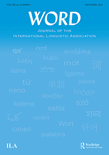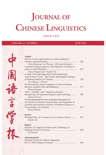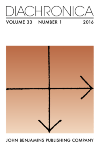
LINGUA NOSTRA
Scope & Guideline
Unveiling the intricacies of linguistic phenomena.
Introduction
Aims and Scopes
- Historical Linguistics:
The journal emphasizes the evolution and historical context of the Italian language, exploring various periods, dialects, and significant linguistic shifts. - Lexicography and Terminology:
A core focus on the study of lexicons, including specialized terminology in fields such as psychoanalysis, law, and cultural studies, reflecting the journal's commitment to understanding language in specific contexts. - Interdisciplinary Approaches:
LINGUA NOSTRA encourages interdisciplinary research that intersects linguistics with law, literature, and cultural studies, highlighting the multifaceted nature of language. - Cultural and Social Linguistics:
The journal examines the relationship between language and society, including the impact of social changes on language use and the role of language in cultural identity. - Contemporary Linguistic Issues:
Research addressing modern linguistic challenges, including the effects of social phenomena like COVID-19 on language, showcases the journal's relevance to current events.
Trending and Emerging
- Language and Identity:
There is a growing focus on how language shapes and reflects cultural identity, particularly in the context of immigration and globalization, indicating an evolving discourse on language use. - Impact of COVID-19 on Language:
Recent studies analyzing the language used during the COVID-19 pandemic suggest an emerging interest in how crises influence linguistic practices and public discourse. - Psychoanalysis and Language:
An increasing number of publications exploring the terminology of psychoanalysis in Italy indicates a trend towards integrating psychological perspectives into linguistic studies. - Interdisciplinary Dialogues:
The trend towards interdisciplinary research, particularly at the intersection of linguistics, law, and cultural studies, highlights a burgeoning interest in how language operates within various societal frameworks. - Historical Contextualization of Modern Language:
Emerging themes include the historical contextualization of contemporary language use, reflecting a desire to understand current linguistic phenomena through a historical lens.
Declining or Waning
- Traditional Lexicography:
There has been a noticeable decline in studies focusing solely on traditional lexicographic practices, as newer methodologies and interdisciplinary approaches gain traction. - Historical Figures and Events:
Research centered exclusively on historical figures, such as specific poets or linguists from earlier centuries, seems to be waning, possibly overshadowed by broader thematic explorations. - Dialect Studies:
While dialect studies have been a staple, there appears to be a reduction in papers dedicated solely to regional dialects, as the journal shifts towards more contemporary linguistic analyses. - Language Purism:
Themes related to language purism, particularly in the context of Italian language preservation, are becoming less frequent, suggesting a move towards a more inclusive understanding of language evolution.
Similar Journals

Mandenkan-Bulletin Semestriel d Etudes Linguistiques Mande
Unveiling Insights into Mande Language StudiesMandenkan-Bulletin Semestriel d'Etudes Linguistiques Mande is an esteemed academic journal dedicated to the exploration of Mande languages and linguistics, published by the Centre National de Recherche Scientifique in France. With its ISSN 0752-5443, this journal has established itself within the linguistic community, holding a notable Q3 ranking in both the Linguistics and Language category as well as respectable standings in Scopus ranks, placing it in the 55th percentile for language and linguistics. Since its inception in 2018, it has been pivotal in publishing groundbreaking research that advances our understanding of the Mande language family and its cultural implications. Although currently not open access, the journal offers a wealth of knowledge fostered through rigorous peer-reviewed articles aimed at linguists, researchers, and students alike, making significant contributions to the fields of linguistics and African studies.

WORD-JOURNAL OF THE INTERNATIONAL LINGUISTIC ASSOCIATION
Connecting researchers and educators in the world of language studies.WORD-JOURNAL OF THE INTERNATIONAL LINGUISTIC ASSOCIATION is a leading peer-reviewed journal dedicated to advancing the field of linguistics and language studies. Published by Routledge Journals, Taylor & Francis Ltd, this esteemed journal has earned a reputation for its rigorous scholarship, reflected in its 2023 Q2 ranking in Linguistics and Language and its solid performance in Scopus Ranks. Encompassing a wide range of topics—from theoretical frameworks to empirical research—WORD serves as an essential resource for linguistics researchers, educators, and students alike. While currently not operating under an open access model, the journal is committed to providing high-quality, impactful research articles that contribute significantly to the linguistic community. With its convergence periods from 1998 to 2009 and 2015 to 2024, WORD continuously fosters the discourse of language studies, ensuring that critical insights and discussions are accessible for ongoing academic exploration.

JOURNAL OF CHINESE LINGUISTICS
Fostering Interdisciplinary Dialogue in Chinese LinguisticsJOURNAL OF CHINESE LINGUISTICS, published by the JOURNAL CHINESE LINGUISTICS, is a prominent periodical that serves as a vital resource for researchers and scholars in the fields of linguistics and Chinese studies. With its ISSN 0091-3723, this journal has been contributing to the academic community since 1996 and continues to publish innovative research until 2024. Although it is classified in the third quartile (Q3) for both Arts and Humanities and Linguistics categories, its focus on Chinese linguistics positions it uniquely within this specialized domain. The journal is committed to advancing the understanding of Chinese language structures, usage, and context, encouraging interdisciplinary dialogue among linguists and language researchers. While currently not labeled as open access, the journal remains accessible to institutions and scholars worldwide, creating an invaluable platform for disseminating knowledge. As such, it plays a critical role in promoting linguistic diversity and cultural awareness within the academic landscape.

Verba-Anuario Galego de Filoloxia
Connecting Academia: Your Gateway to Linguistic InsightsVerba-Anuario Galego de Filoloxia is a prominent academic journal published by UNIV SANTIAGO COMPOSTELA, dedicated to advancing the field of linguistics and language studies. Hailing from Spain, this journal provides a vital platform for researchers, educators, and students interested in Galician philology and its broader linguistic implications. Although it operates under traditional access models, the journal’s commitment to quality research is reflected in its categorization within Q3 in Linguistics and Language for 2023, showcasing its significant contributions to the field. Encompassing a convergence period from 2017 to 2024, Verba garners attention in both the Arts and Humanities and Social Sciences domains, with its Scopus rankings highlighting its moderate impact within these categories. By nurturing scholarly dialogue and disseminating innovative studies, Verba-Anuario Galego de Filoloxia plays a crucial role in promoting linguistic research, making it an essential resource for professionals and academic institutions striving to explore the complexities of language and philology.

Lingua Montenegrina
Fostering Academic Dialogue on Montenegrin HeritageLingua Montenegrina is a distinguished academic journal dedicated to exploring and advancing the fields of Montenegrin language and literature. Published by the Institute of Montenegrin Language and Literature, this journal serves as a vital platform for researchers, educators, and students interested in the nuances and development of Montenegrin linguistics, literature, and cultural studies. With an ISSN of 1800-7007, it contributes significantly to the scholarly discourse in the region and beyond. While the journal operates under a traditional subscription model, it ensures that its readership has access to high-quality research that is pivotal for understanding Montenegrin identity and cultural expressions. The commitment of Lingua Montenegrina to rigorous academic standards and its focus on regional studies positions it as an essential resource for those looking to deepen their understanding of the Montenegrin language and its literary heritage.

Diachronica
Exploring the Evolution of Language and ThoughtDiachronica is a prestigious academic journal published by John Benjamins Publishing Co that specializes in the fields of Linguistics and Philosophy. Established in 1984, it has become a significant platform for researchers and scholars to disseminate their work on language change and diachronic linguistics, offering insights into the evolution of languages over time. With an impressive impact factor and recognized rankings within the Q2 category for both Linguistics and Language as well as Philosophy in 2023, Diachronica offers a valuable resource for academics interested in the interplay between historical linguistics and philosophical discourse. Although the journal is not open access, it ensures that its articles are rigorously peer-reviewed and of high academic quality. For researchers, professionals, and students looking to deepen their understanding of language dynamics, Diachronica stands out as an essential component of the scholarly dialogue surrounding linguistic change.

Language and Linguistics
Shaping the Future of Linguistics, One Article at a TimeLanguage and Linguistics is a leading academic journal published by ACAD SINICA, INST LINGUISTICS, based in Taiwan. Established in 2008, this journal has rapidly gained recognition within the field of linguistics, achieving a commendable ranking of Q2 in the 2023 category quartiles and holding positions in the top percentiles of Scopus rankings for both Arts and Humanities and Social Sciences. With an ISSN of 1606-822X and an E-ISSN of 2309-5067, the journal aims to foster the development of linguistics research by providing a platform for the dissemination of innovative and interdisciplinary studies. While it currently operates on a traditional subscription model, its significant contribution to the advancement of linguistic theory and its applications makes it an invaluable resource for researchers, professionals, and students alike. Spanning converged years from 2008 to 2024, Language and Linguistics continues to shape the dialogue in understanding language phenomena and encourages submissions that push the boundaries of current linguistic knowledge.

REVUE DE LINGUISTIQUE ROMANE
Charting the Evolution of Romance LinguisticsREVUE DE LINGUISTIQUE ROMANE, published by the esteemed SOCIÉTÉ LINGUISTIQUE ROMANE, is a prominent academic journal dedicated to the exploration of Romance linguistics. With its ISSN 0035-1458, the journal plays a significant role in advancing knowledge within the fields of linguistics and the history and philosophy of science. Although it does not currently offer Open Access, it provides critical insights and peer-reviewed research that are indispensable for scholars, educators, and students interested in the nuances of Romance languages. The journal, which has seen converged coverage from 2006 to 2017, and then again from 2019 to 2021, is ranked in the third quartile (Q3) across various categories within Scopus, reflecting its established presence in the academic community. As a vital resource for interdisciplinary studies, REVUE DE LINGUISTIQUE ROMANE is instrumental for those seeking to deepen their understanding of linguistic structures, cultural nuances, and the historical development of Romance languages.

NEUPHILOLOGISCHE MITTEILUNGEN
Exploring the Depths of Language and LinguisticsNEUPHILOLOGISCHE MITTEILUNGEN, published by the esteemed Modern Language Society, stands as a significant contribution to the domain of Language and Linguistics. With a history dating back to 1971, this journal has consistently provided an academic platform for researchers and scholars, navigating through the intricacies of philology and linguistic studies. Although it is indexed in Scopus with rankings reflecting its position in the Arts and Humanities and Social Sciences categories, it currently does not offer Open Access, which may require interested parties to seek institutional access for its wealth of content. The journal has experienced periods of coverage discontinuation in recent years, yet it remains a valued source for advancing the understanding of language theories and linguistic practices. Its location in Helsinki, Finland, offers a unique European perspective on global linguistic issues. The journal is ideal for those looking to engage with evolving linguistic trends and contribute to contemporary discussions in the field.

Jezikoslovlje
Fostering Dialogue in Linguistic ResearchJezikoslovlje, published by the Josip Juraj Strossmayer University, Faculty of Philosophy in Croatia, is an essential publication in the field of Linguistics and Language Studies. Launched in 2008 and extending its contributions to the academic community through 2024, this journal addresses a spectrum of linguistic research, facilitating scholarly dialogue around both theoretical and applied aspects of language. With a current Scopus ranking placing it in the 54th percentile in the Arts and Humanities and the 50th percentile in Social Sciences, Jezikoslovlje serves as a vital resource for researchers and students looking to engage with contemporary linguistic issues. Although it operates under a traditional access model, its indexed presence and rigorous peer-review process ensure that published works maintain a high scholarly standard, inviting contributions that advance understanding in this dynamic discipline. The journal's commitment to fostering knowledge in linguistics makes it a significant platform for academics in Croatia and beyond.